Five Paths, One Journey
Features
By Chante Griffin
For many, the path to college is easy—even assumed. But this isn’t true for all. Nationwide, 34 percent of students who attend a college or university are first-generation college students, according to a 2012 study by the National Center for Education Statistics. Of these students, only 50 percent complete their college degree in six years, according to a 2011 report by the Higher Education Research Institute.
The first in their families to attend college, these five men share their stories about their paths to higher education, their transitions to collegiate life, and how Sigma Nu provided the community of support they needed to succeed.
Ismail Parks (Cal State Los Angeles)
The Reluctant Collegian
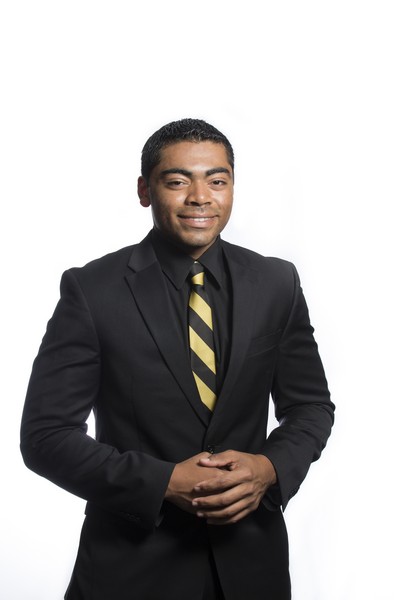 “I really didn’t want to go to school for four more years,” Ismail Parks admits. To him, college seemed lofty and expensive. No one in his family had attended, and his parents weren’t encouraging him to attend either. The turning point for this Riverside, California native came through his high school AVID (Advancement Via Individual Determination) classes. The college preparatory classes introduced him to rigorous academics and paired him with university mentors to guide him through the college application process.
“I really didn’t want to go to school for four more years,” Ismail Parks admits. To him, college seemed lofty and expensive. No one in his family had attended, and his parents weren’t encouraging him to attend either. The turning point for this Riverside, California native came through his high school AVID (Advancement Via Individual Determination) classes. The college preparatory classes introduced him to rigorous academics and paired him with university mentors to guide him through the college application process.
“My teachers really encouraged me,” Ismail recalls. “They mentioned better jobs and specifically better pay. Getting a degree would make providing for my family a lot easier.” He applied not knowing how he or his family would be able to finance his education.
Ismail’s desire to stay close to home limited his college search solely to in-state schools, and he ultimately chose Cal Sate University Fullerton, a school with a strong business program, located just thirty miles from his family.
Like many first-generation college students, Ismail’s transition to college necessitated a mental shift. “It was a psychological switch,” he says. “You’re doing self-learning, and that push from your teachers is not there.” Despite the lack of support, Ismail survived his first year with relative ease. However, the year left him desiring more: “My first year wasn’t that great because I was going to class and going straight back to my dorm room instead of trying to get to know other people or get involved on campus.”
Ismail decided to join a fraternity the following year and chose Sigma Nu because of its guiding principles: “They share a lot of my values, in terms of ‘school comes first’ and family.” Now, Ismail has a vibrant social life that includes community service and philanthropy, as well as academic support and accountability. When Ismail was struggling in an accounting class, for example, he was paired with an accounting major in his chapter who met with him two to three times a week. “It [Sigma Nu] has kept me on track,” Ismail says. “Sigma Nu provides that extra push.”
Ismail hopes that the “extra push” enables him to experience success in business so that he can care for his family. “I want to buy my family a house: my mom, my dad, my sister. My mom and my dad never owned a house. If I can do that for them, it would mean that I’ve done my job.”
Tomaz Karwas (Minnesota)
The Standard-Bearer
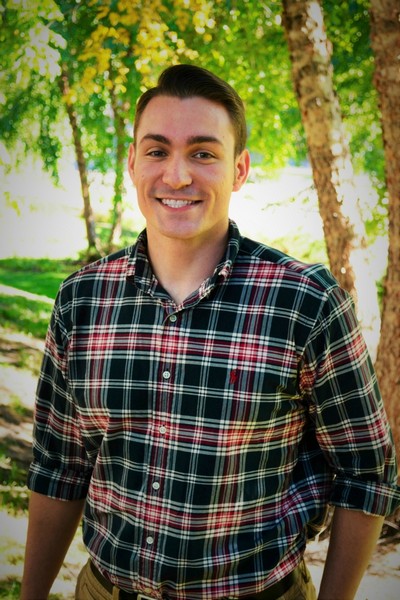 University of Minnesota senior Tomaz Karwas holds himself to a high standard. The son of Polish immigrants, he intends to make his family proud. I’m first generation,” Tomaz states proudly. “The first generation to attend college and the first to be American by birth.” For him the distinction is both a privilege and a responsibility.
University of Minnesota senior Tomaz Karwas holds himself to a high standard. The son of Polish immigrants, he intends to make his family proud. I’m first generation,” Tomaz states proudly. “The first generation to attend college and the first to be American by birth.” For him the distinction is both a privilege and a responsibility.
Tomaz’s mother Renata raised Tomaz after his father passed away when he was just eight months old. Tomaz grew up in Portage Park, a neighborhood on the outskirts of Chicago. Determined to give her son the promise of the American dream, Renata cleaned offices in downtown Chicago for the majority of the day, leaving Tomaz with his maternal grandpa, who became a primary caregiver.
Though Tomaz’s family was unfamiliar with college life and the application process, it didn’t stop them from being active in his pursuit of higher education. They peppered him with questions about his career path: “Are you going to be a doctor? A lawyer? A priest?” And when it was time to visit prospective colleges, his Uncle Wojciech (also known as “Bert”), took him on a college tour to Nevada and Minnesota.
Tomaz settled on the University of Minnesota at Twin Cities, where he is a health and wellness major with an emphasis on public health. His Uncle Bert encouraged him to join Sigma Nu because of the networks and friendships that it would provide, and Tomaz found this to be true during a time when he needed friends the most. “When I lost my grandpa,” Tomaz shares, “the guys reached out to me.” They offered condolences, listened to him, and offered to help in any way possible. The experience (albeit difficult) allowed Tomaz to experience the supportive strength of Sigma Nu’s brotherhood first-hand.
When Tomaz is not working one of his two jobs or participating in a Sigma Nu activity, he studies for the PCAT (Pharmacy College Admissions Test). Tomaz credits his family and his fraternity for his success and aspirations. “I’m glad that Sigma Nu is one of the organizations on campus that does value being committed to excellence. At the end of the day, we hold ourselves to a higher standard.” Tomaz continues, “I am super fortunate—coming here to America. My uncle tells me that he’s living his college experience through me. It’s something he wishes he could've done, so hope I don’t mess it up.”
Armaan Patel (DePauw)
The Reluctant Socialite
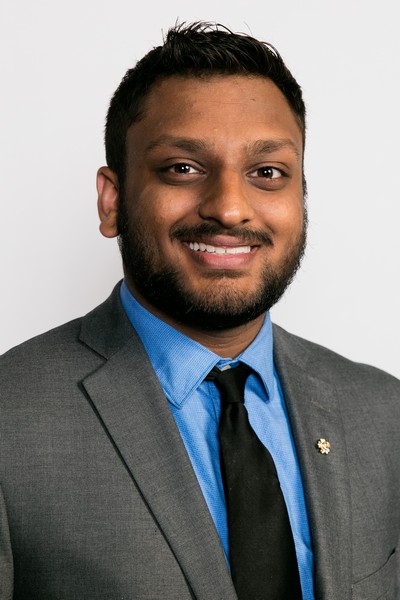 Twenty-year-old DePauw University student Armaan Patel was the first person in his family to attend college in the United States. To his Indian born-and-raised parents, education wasn’t just the most important thing; it was the only thing. When it was time to apply to colleges, however, Armaan had to lead himself. “I had to figure it out own my own, and schedule college visits for myself, and drag my parents along,” he says.
Twenty-year-old DePauw University student Armaan Patel was the first person in his family to attend college in the United States. To his Indian born-and-raised parents, education wasn’t just the most important thing; it was the only thing. When it was time to apply to colleges, however, Armaan had to lead himself. “I had to figure it out own my own, and schedule college visits for myself, and drag my parents along,” he says.
Armaan and his family settled on Howard University, in part because he received a full-ride scholarship, but his first year revealed something that he had never before realized—having a social life was almost as important, if not as important, as academics.
When considering a transfer to DePauw, Armaan says his parents asked, “Is their education good?” coupled with an advisory warning, “Stay away from [a] party school.”
Armaan laughs, “What they didn’t understand is that every school is a party school.” Armaan admits that the huge social scene at DePauw took some getting used to, especially for someone who had never been to a party before college. He explains, “How I got used to it was—putting myself out there and going out with my friends. I had to learn that it was okay for me to try new things.”
While his parents initially thought that participation in Sigma Nu would hurt Armaan’s grades, he says that Sigma Nu has given him tools and resources that have enriched his academic life, and that participation in the fraternity has enhanced all aspects of his college career.
“Joining Sigma Nu has given me the opportunity and knowledge to become a leader, someone who goes against the grain, someone unique,” Armaan says. As Lieutenant Commander of his chapter, he is responsible for helping his brothers become leaders, and he has a vision for his chapter. “We’re working to give our house, and other fraternity men, a better name and a better reputation,” he says. For Armaan this includes creating leadership events, community service opportunities, and being social in a way that supports academic achievement.
Jack Ward Herndon (Charleston)
The Pioneer
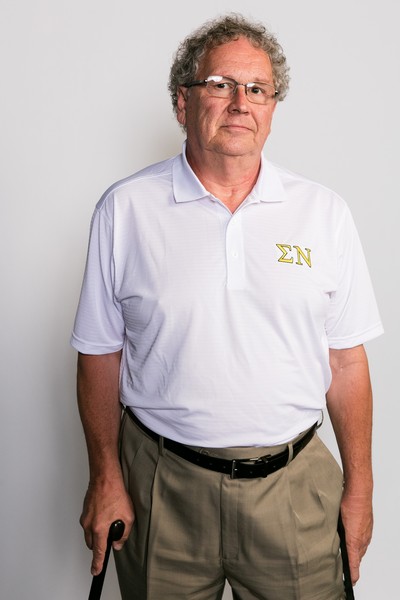 When asked to describe his parents, Jack Ward Herndon says, “They were pretty impoverished, but they gave me everything that they could.” This included a commitment to service (his mom volunteered as a candy striper in World War II), and a value for education, even though they hadn’t pursued higher education themselves.
When asked to describe his parents, Jack Ward Herndon says, “They were pretty impoverished, but they gave me everything that they could.” This included a commitment to service (his mom volunteered as a candy striper in World War II), and a value for education, even though they hadn’t pursued higher education themselves.
Jack grew up on the small Isle of Palms, located thirteen miles from Charleston, South Carolina. His dream of attending a university was birthed in his grandma’s downtown home, located just one block from the College of Charleston. The images of students trouping to and fro, with backpacks in tow, inspired Jack to do the same.
Jack arrived at the College of Charleston in 1971, and although he received bids from two fraternities that year, he declined them because they “never felt right.” The following year, however, staff from the Sigma Nu General Fraternity arrived on campus to recruit students for a new colony. When it looked like a vibrant chapter wasn’t a viable option (only three people attended the interest meeting), Jack and two other young men said, “Let us be your core group.” General Fraternity expansion staff acquiesced, and by the spring of 1973 it had developed into a thirteen-member colony. As Jack recounts, “We held a ceremony in the Knights of Columbus Hall, two blocks from my granny’s house.”
Jack and his brothers dove into service, making it their priority. “We went out to senior centers, before it was cool. We did activities with them and hosted events for them. We raised funds. Pretty much any event we had was […] based on philanthropy”
They threw themselves into their academics with just as much gusto. “If I had problems with anything, I had brothers to go to and ask, ‘Well what should I do about this’—as far as grades go or studying goes. We had study halls back then, too. They weren’t required by anyone, but we did them because we were a small group of guys and we knew that we needed to do well.”
Matt Tudor (Eastern Kentucky)
The Veteran
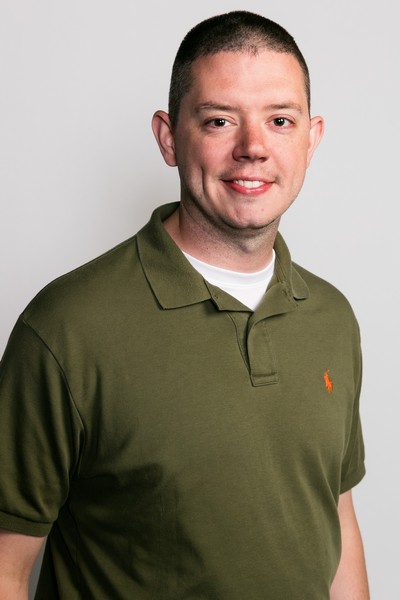 Kentucky-born Matt Tudor wasn’t just the first person in his family to graduate from college; he was the first person in his immediate family to graduate from high school. Although he was raised in Richmond, Kentucky—a small college town that houses Eastern Kentucky University (EKU)—Matt was never encouraged to attend college. In fact, his family didn’t understand why he even wanted to. Matt explains, “We are a family-oriented family. People get married early. That’s not the way I wanted to do it.”
Kentucky-born Matt Tudor wasn’t just the first person in his family to graduate from college; he was the first person in his immediate family to graduate from high school. Although he was raised in Richmond, Kentucky—a small college town that houses Eastern Kentucky University (EKU)—Matt was never encouraged to attend college. In fact, his family didn’t understand why he even wanted to. Matt explains, “We are a family-oriented family. People get married early. That’s not the way I wanted to do it.”
Matt learned the value of hard work as a kid, while working 14 to 16 hours a day on a farm, earning 25 to 30 dollars a week. A self-sufficient kid, he let himself into his house each day after school and entertained himself with video games and books. When it was time to do his homework, he was on his own as well. “I remember in middle school, asking my dad for help with a math problem and he replied, ‘I have no idea…’”
Determined to leave the farm and do something different with his life, Matt decided to serve his country in the military, even though he was just seventeen and couldn’t yet vote. Once separated from his family and the “small town mentality,” Matt decided that he wanted to pursue a college degree in homeland security. “I researched, and lo and behold Richmond had one of the top programs,” he recalls. So after six years of service in the Army (which included conducting intelligence and counterintelligence operations in the Middle East in 2006 and 2007) Matt found himself back home in Richmond—only this time as a college student at EKU.
Matt was drawn to Sigma Nu because of its military origins. “You have x amount of study hours that you have to complete per week,” he says. “They expect you to have so many service hours for that semester, so many social hours for that semester. In a way it’s kind of like College for Dummies.” It was this structure that made his transition to college as a first-generation student easier.
The Road Ahead
As first-generation students continue to fill the halls of colleges and universities across the nation this fall, some of these men offer advice on how fraternities (and Sigma Nu in particular) can provide additional support.
Ismail believes that scholarships designated for first-generation students would help tremendously. “I feel like a lot of first-gen college students financially can’t do it. That was the first holdback to me going to college, [me thinking] ‘Can my parents actually afford to provide financially for my school?’”
Jack suggests targeting first-gen students before they even step foot on campus: “I don’t know how much the high schools will allow, but going out to area high schools, trying to recruit. I think that would be somewhat helpful—to introduce them to that part of the college life, as well as the academic part.”
Armaan stresses the importance of recruitment as well. “I think the biggest issue is talking to them, finding first-gen or international students, ‘cause one, we don’t necessarily seek them out and two, they don’t seek us out, so it’s a double-edged sword.”
Lastly, Matt suggests that Sigma Nu continue doing what it has always done. “I think a lot of stuff that we do already are things that can benefit first-gen college students.”
This includes support, brotherhood, leadership and excellence—all key ingredients, not just for first-generation students, but for all students.